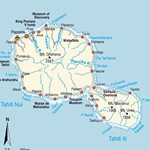Colors of Tahiti Island - traditions, festivals, mentality and lifestyle
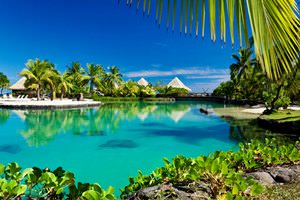 The indigenous Tahitians are of Polynesian ancestry comprising the gross of the population. French is the official language but Tahitian and French are both in use. If you know French, communicating with the locals will have no difficulty. At the same time, you can use English for communication with the guides, waiters and hotel staff. If you are interested in the local traditions and rituals, you can visit a tourist village where you will find more about the local arts, crafts, and ceremonies. You will have a chance to explore the traditional houses; however, in everyday life, it will be rather difficult to find many ethnic colors.
The indigenous Tahitians are of Polynesian ancestry comprising the gross of the population. French is the official language but Tahitian and French are both in use. If you know French, communicating with the locals will have no difficulty. At the same time, you can use English for communication with the guides, waiters and hotel staff. If you are interested in the local traditions and rituals, you can visit a tourist village where you will find more about the local arts, crafts, and ceremonies. You will have a chance to explore the traditional houses; however, in everyday life, it will be rather difficult to find many ethnic colors.
1. The best time to visit the island is from May to October, the rest of the year is the rainy season, especially frequent storms occur in January. However if you are not afraid of storms …  Open
Open
The coastal area Tahiti is notable for its amazing contrasts. There are gorgeous beaches with white coral sand, and exotic parts of the coast covered with black volcanic sand. The most …  Open
Open
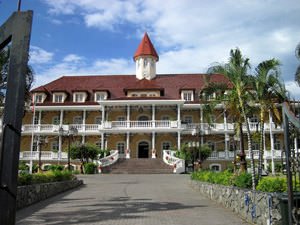 While planning your travel to the island, keep in mind that only the people living in the regions visited by many tourists can speak English. Generally, everyone knows French here; and yet in some out settlements, you will need a local translator to communicate with the residents. By the way, there are some words in the Tahitian language, which cannot be translated literally. The word “mana” can be cited as an example. “Mana” has many meanings according to the conversation context and can stand for intelligence, beauty, erudition, charisma, dexterity or attractiveness. According to Tahitians, “mana” is a kind of inner spiritual energy. Frequently you can hear such a phrase as “he has mana”, which means “he has learnt some fundamental truth”.
While planning your travel to the island, keep in mind that only the people living in the regions visited by many tourists can speak English. Generally, everyone knows French here; and yet in some out settlements, you will need a local translator to communicate with the residents. By the way, there are some words in the Tahitian language, which cannot be translated literally. The word “mana” can be cited as an example. “Mana” has many meanings according to the conversation context and can stand for intelligence, beauty, erudition, charisma, dexterity or attractiveness. According to Tahitians, “mana” is a kind of inner spiritual energy. Frequently you can hear such a phrase as “he has mana”, which means “he has learnt some fundamental truth”.
Tahiti has several luxury resorts that won’t disappoint even the most discerning travelers. The popular hotel Le Meridien is situated at the Punaauia Beach; that’s one of the …  Open
Open
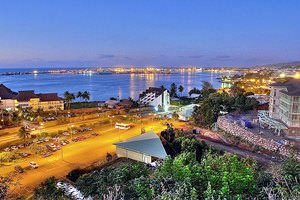 However, the locals celebrate not only religious holidays on Tahiti. It is good practice to celebrate the New Year, Chinese New Year, Victory Day, Bastille Day, and Independence Day. It is rather interesting to know that the Missionary Day is celebrated annually on March 5 in French Polynesia to mark the arrival of the London Missionary Society missionaries in 1797.
However, the locals celebrate not only religious holidays on Tahiti. It is good practice to celebrate the New Year, Chinese New Year, Victory Day, Bastille Day, and Independence Day. It is rather interesting to know that the Missionary Day is celebrated annually on March 5 in French Polynesia to mark the arrival of the London Missionary Society missionaries in 1797.
If you have shopping plans during your stay in Tahiti, we recommend visiting Papeete since the main places for shopping are located here. It is worth noting that there are no tremendous …  Open
Open
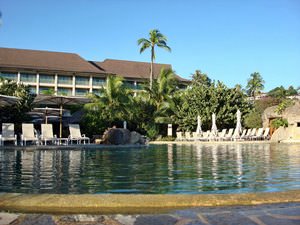 As for religions due to the influence of the missionaries the greater part of the population professes Catholicism or Protestantism, however, some people are worshippers of local ancient cults. Polynesians are very friendly towards both each other and tourists. It is very nice that you will not be followed by crowds of beggars and bargainers here who will force you to buy some souvenirs. The locals are very delicate in regards to anyone’s private space. It is common here not to be in a hurry. Therefore, if you get used to the fast pace of life, it will be rather difficult to adapt yourself; however, there is no need to complain in this regard and lose your temper.
As for religions due to the influence of the missionaries the greater part of the population professes Catholicism or Protestantism, however, some people are worshippers of local ancient cults. Polynesians are very friendly towards both each other and tourists. It is very nice that you will not be followed by crowds of beggars and bargainers here who will force you to buy some souvenirs. The locals are very delicate in regards to anyone’s private space. It is common here not to be in a hurry. Therefore, if you get used to the fast pace of life, it will be rather difficult to adapt yourself; however, there is no need to complain in this regard and lose your temper.
The largest island in French Polynesia and the location of its capital, Tahiti, has long attracted the attention of thousands of curious tourists. The island provides a lot of natural and …  Open
Open
 This island country is also famous for its ideal conditions and facilities for surfing. In September, Tahiti welcomes the participants of the annual surfing competition called Billabong Pro Tahiti. Actually, Tahitians are fond of extreme sports. On February 12, the Moorea Marathon is held on Tahiti's sister island Moorea. The marathon participants run accompanied by national music; every year this sporting event attracts many runners and spectators. In May, Moorea greets the festival of extreme sports such as kayak and canoe racing, mountain climbing and cycle racing.
This island country is also famous for its ideal conditions and facilities for surfing. In September, Tahiti welcomes the participants of the annual surfing competition called Billabong Pro Tahiti. Actually, Tahitians are fond of extreme sports. On February 12, the Moorea Marathon is held on Tahiti's sister island Moorea. The marathon participants run accompanied by national music; every year this sporting event attracts many runners and spectators. In May, Moorea greets the festival of extreme sports such as kayak and canoe racing, mountain climbing and cycle racing.
Family holidays with kids in Tahiti Island. How to entertain your child, things to show to children.
Tahiti is an excellent choice for a family vacation. Your kid will definitely feel like a path-breaker on this island, which can easily be called a paradise, and will have lots of …  Open
Open
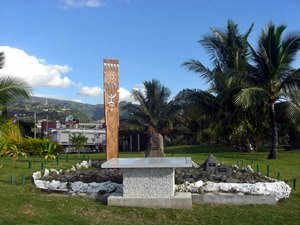 One more national festival is Heiva des Artisans; it is organized for artisans. Here you can see a big variety of traditional handicrafts and learn about the production process of local pottery, wicker hats, woven rugs, pearl processing, and many other things. You will have a chance to buy original souvenirs and to taste national food baked in banana leaves. On a large scale, Polynesians celebrate the Chinese New Year, which lasts from February 9 to 24. Due to the influence of the Chinese expat community, this holiday has been granted national status. Believe us – during the festival, you will enjoy so many things such as fireworks, holiday parades, musicians’ performances.
One more national festival is Heiva des Artisans; it is organized for artisans. Here you can see a big variety of traditional handicrafts and learn about the production process of local pottery, wicker hats, woven rugs, pearl processing, and many other things. You will have a chance to buy original souvenirs and to taste national food baked in banana leaves. On a large scale, Polynesians celebrate the Chinese New Year, which lasts from February 9 to 24. Due to the influence of the Chinese expat community, this holiday has been granted national status. Believe us – during the festival, you will enjoy so many things such as fireworks, holiday parades, musicians’ performances.
The cuisine of Tahiti has absorbed both the traditional meals and French classic recipes. The fresh and natural ingredients used in the local restaurants and cafes will impress you. It is …  Open
Open
This guide to traditions and festivals in Tahiti Island is protected by the copyright law. You can re-publish this content with mandatory attribution: direct and active hyperlink to www.orangesmile.com.
City tours, excursions and tickets in Tahiti Island and surroundings
Reference information
Cathedrals and basilicas near Tahiti Island
♥ Cathédrale Notre-Dame de l’Immaculée Conception, Papeete, 4.3 km from the center. On the map Photo
Photo

♥ Cathédrale Notre-Dame de l’Immaculée Conception, Papeete, 4.3 km from the center. On the map
National traditions of French Polynesia
 One of the most interesting concepts in French Polynesia is the mystical “mana”. Mana can mean a lot of things: vitality, independence, beauty, grandeur, intelligence, truth, and so on. It mainly depends on the situation and what needs to be expressed. When people say about a person: “he has mana”, often means that he has attained some kind of enlightenment. Another distinctive Polynesian trait is widely spread tattoos. Tattooing has always been an important part of the Polynesian culture and could be drawn to the skin as a sign of belonging to some tribe or a symbol of the transition from childhood to adulthood. The word itself “tattoo” is of Tahitian origin. The Tahitians had a god of tattoos, known for decorating all the fish. Each line of the tattoo on the body, each dash is still considered to be connected with mana. Most of the islanders believe that every Polynesian should have at least one tattoo.
… Open
One of the most interesting concepts in French Polynesia is the mystical “mana”. Mana can mean a lot of things: vitality, independence, beauty, grandeur, intelligence, truth, and so on. It mainly depends on the situation and what needs to be expressed. When people say about a person: “he has mana”, often means that he has attained some kind of enlightenment. Another distinctive Polynesian trait is widely spread tattoos. Tattooing has always been an important part of the Polynesian culture and could be drawn to the skin as a sign of belonging to some tribe or a symbol of the transition from childhood to adulthood. The word itself “tattoo” is of Tahitian origin. The Tahitians had a god of tattoos, known for decorating all the fish. Each line of the tattoo on the body, each dash is still considered to be connected with mana. Most of the islanders believe that every Polynesian should have at least one tattoo.
… Open 

 English
English Russian
Russian Dutch
Dutch German
German Spanish
Spanish French
French Türkçe
Türkçe
